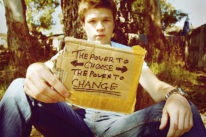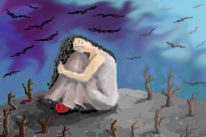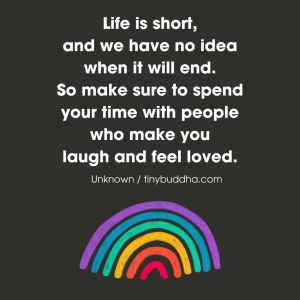
“When you’ve reached rock bottom, there’s only one way to go, and that’s up!” ~Buster Moon, from the movie Sing
When I first heard this saying, as I was watching the movie Sing on my way to another continent, a small light bulb lit up inside me. As I sat with this sentence, I came to the conclusion that I couldn’t agree more.
After hitting my own rock bottom a couple of years ago, I know that once you get there, there is no place you can go that is lower. It’s the final breaking point.
And if there is anything I have learned about the final breaking point, it’s that you have two choices: either give up or start over.
This theory can apply to many aspects of life, like when you’re in a job or career that is no longer working, so you hit rock bottom in a health crisis or a mental breakdown. You have a choice: Be insane and keep going, when you know deep in your heart and gut that this decision isn’t right, or “give up” and finally pursue the career or job that you have always wanted.
Sometimes, rock bottom gives us a good reflection point on what is no longer working in our life, as well as the opportunity to change. But what happens when your rock bottom is wanting to end your life?
I remember it clear as day. It was summer 2020, during the Covid-19 pandemic, and I was working remotely from home, like many others. Nothing was unique about my situation, except the fact that I had ended a very toxic, karmic relationship just three weeks into a global pandemic.
The things that most people do in order to get over a breakup—like see friends and go out and have fun—were all things the whole world had to put on pause. Oh, and top of that, I was worried about dying from Covid.
I never realized the effects lockdown could have on my mental health. While I am naturally introverted, there is a significant difference between being forced to stay in and choosing to do so.
I realized that I had hit rock bottom during a beautiful summer day. I was outside, staring into my backyard, when I realized that I felt nothing. I no longer wanted to live, and I could no longer see the beauty and miracles of everyday life.
I was disappointed that I woke up every single morning, because that meant another day that I had to muscle through. Another day that I had to survive. While I’ve had bouts of depression my entire life, I never came as low as I did then.
By the end of the summer, I knew I had two options: I was either going to save my life or end it. But I also came to a humbling moment when I knew I couldn’t do it myself. I needed therapy. No one else could help me through this except a professional that could help me dissect my feelings, trauma, and emotions, as well as myself.
Starting therapy was a blow to my ego, as I imagine it is for many. It’s sitting there, across from your therapist, when they ask you, “Why are you here?” knowing damn well that you are there so that you don’t die. That you don’t want to suffer anymore. That you are wondering, “Why am I even suffering? Am I just being overdramatic?”
There are so many hard truths that you learn about yourself through therapy. But also, so many enlightening things, like the fact that it wasn’t your fault you endured abuse, gaslighting, and manipulation in past relationships. Even though you thought it was.
Or that trauma literally shuts off the frontal cortex of your brain, especially when you are in “fight or flight” mode, because your body is just trying to survive. This is why there are so many memories that, to this day, I cannot remember. They are little black holes in my brain history.
When you’re in therapy, you don’t notice the gradual changes at first. It’s not until months down the line that you start to notice that little things are bringing you joy once again.
How the sun, in the cold harsh winter, after days of cloudiness, brought a small smile to your face. Or how you realize that you no longer partake in OCD behaviors that you thought you could never break before starting therapy. Or how your irrational fears are no longer at the forefront of your mind anymore.
While not everyone will notice these changes, you will. And you will then start to think about how and why you didn’t start therapy sooner. How and why you didn’t choose yourself sooner. Do not berate yourself; this was all part of your journey.
If there is anything that I have learned by wanting to die, it was that inadvertently, I also wanted to live. I just no longer wanted to live my life through the same suffering and stories. The body, mind, and soul can only sustain pain for so long before it can no longer do it anymore.
One of the most pivotal things about my life, hands down, was my rock bottom because, as the saying goes, I could only go up from there.
Up doesn’t mean that you change your life drastically in one day, or even a couple of months.
Sometimes up is showering after a week of not having the energy to do it. Sometimes up is allowing yourself to feel a slight feeling of joy again, after months and months of darkness. Sometimes up is remembering to eat again, because you never had the appetite to eat when you were at your lowest.
If you’re struggling right now and can’t get out bed, I’m not telling you that you are wasting your life. You are not. Even in the depths of suffering, this is all a part of your journey.
But I can tell you this: Living—not merely existing—is a choice made of lots of little choices. Like the choice to get help. The choice to believe things can get better. The choice to do the little things that help you feel better. And the choice to recognize the small wins along the way.
Other people can support you, but no one can make these choices for you but you.
About Christina Snitko
Christina Snitko is a writer and author of two poetry books, Mirages and Shadows. You can follow her work here.













 Though I run this site, it is not mine. It's ours. It's not about me. It's about us. Your stories and your wisdom are just as meaningful as mine.
Though I run this site, it is not mine. It's ours. It's not about me. It's about us. Your stories and your wisdom are just as meaningful as mine.